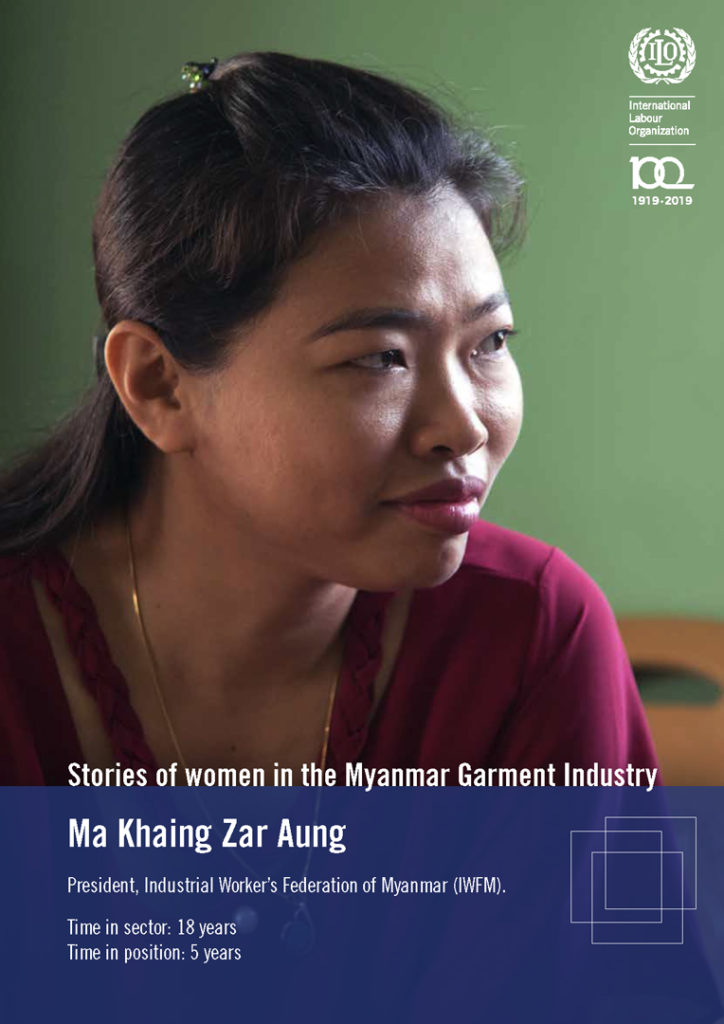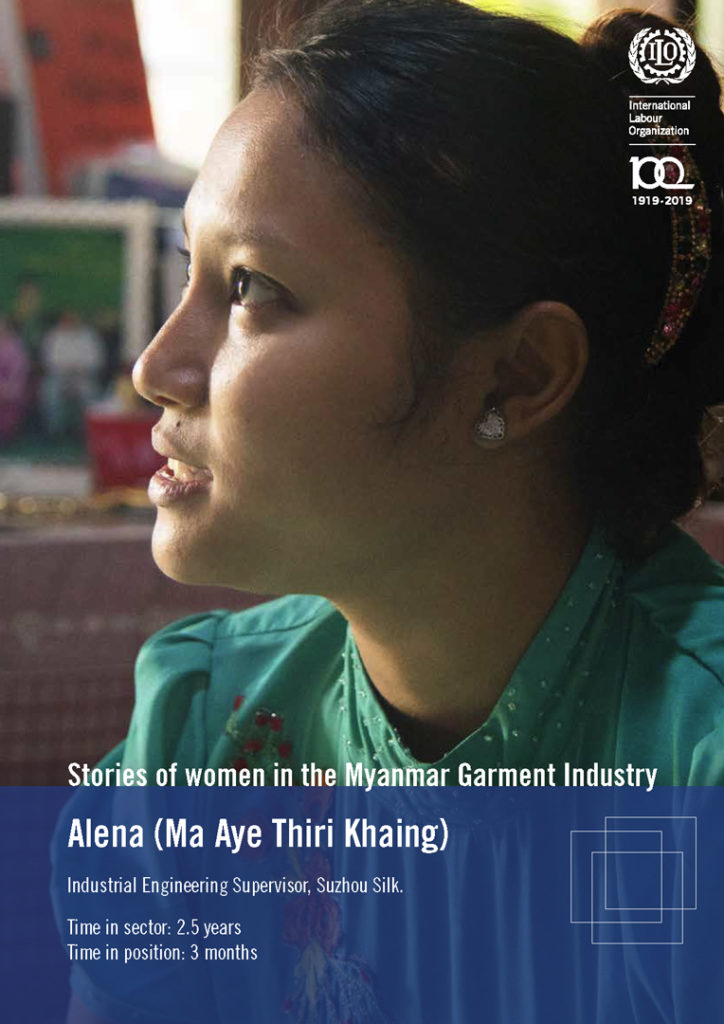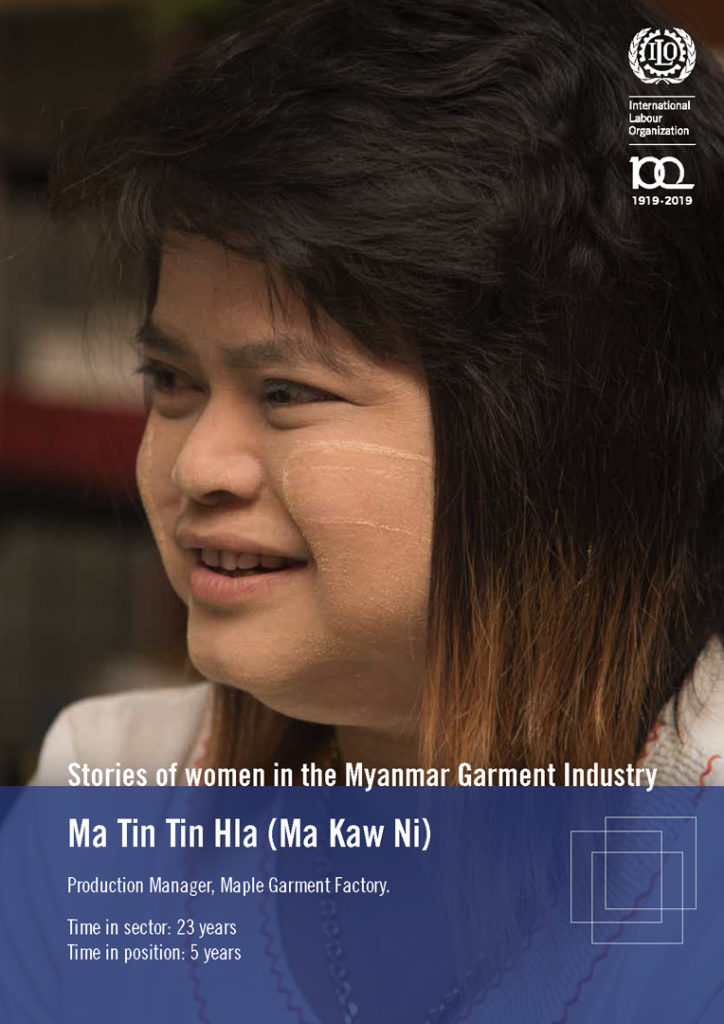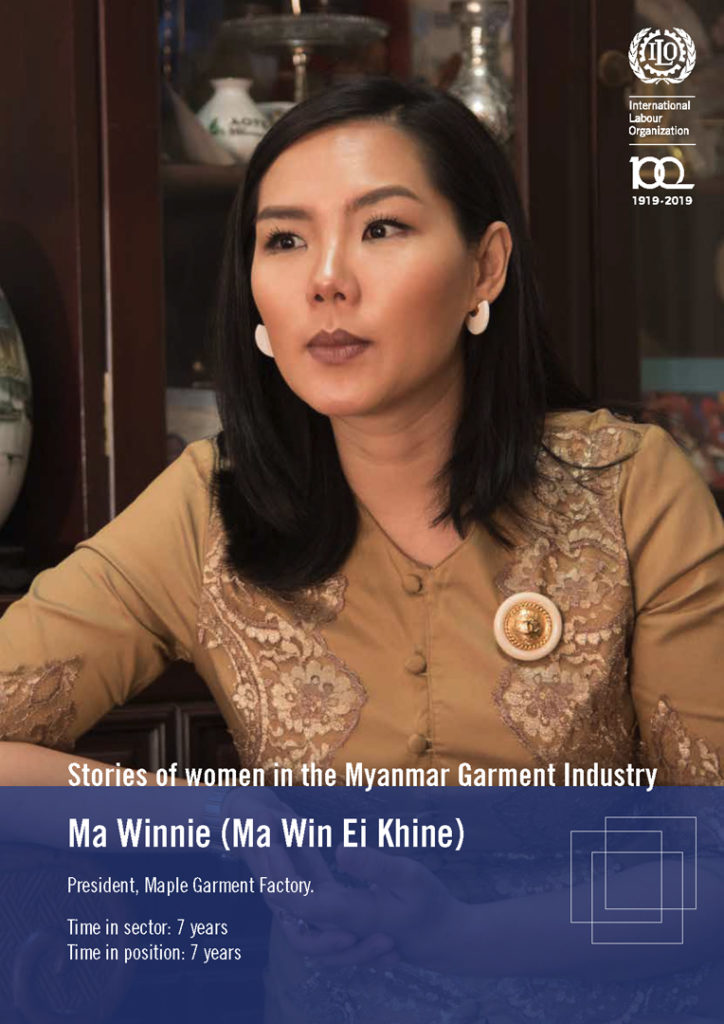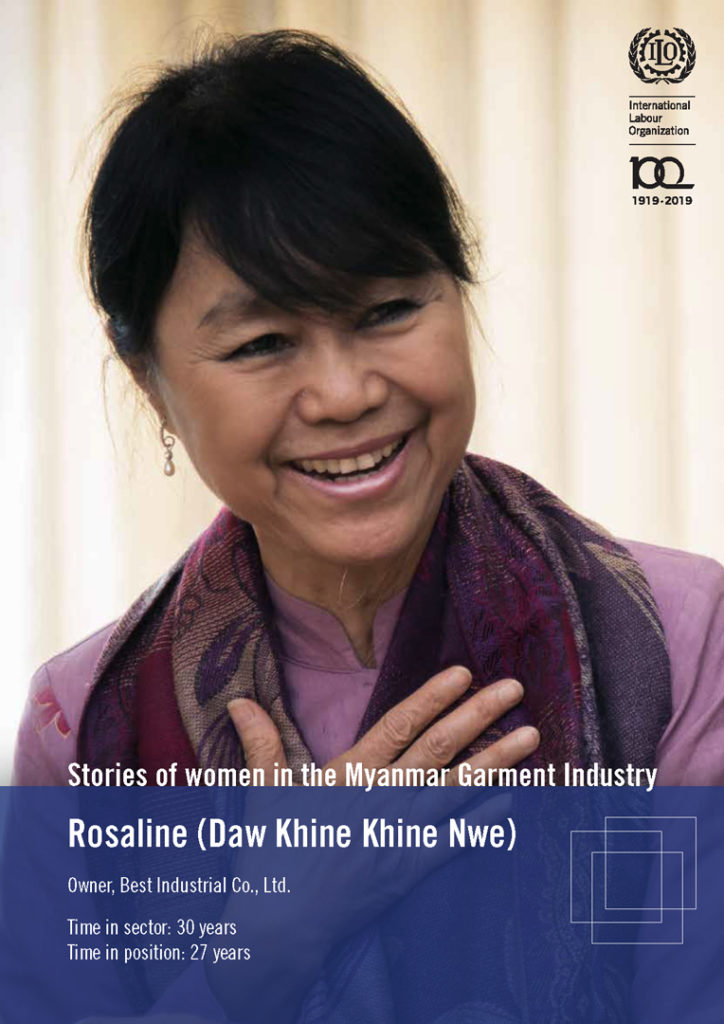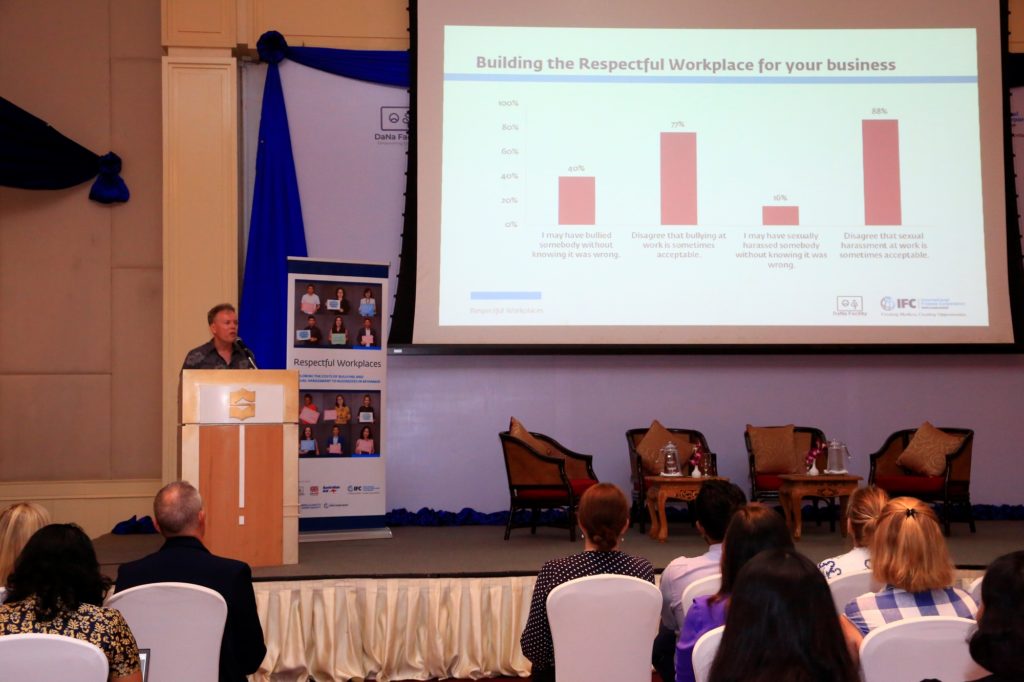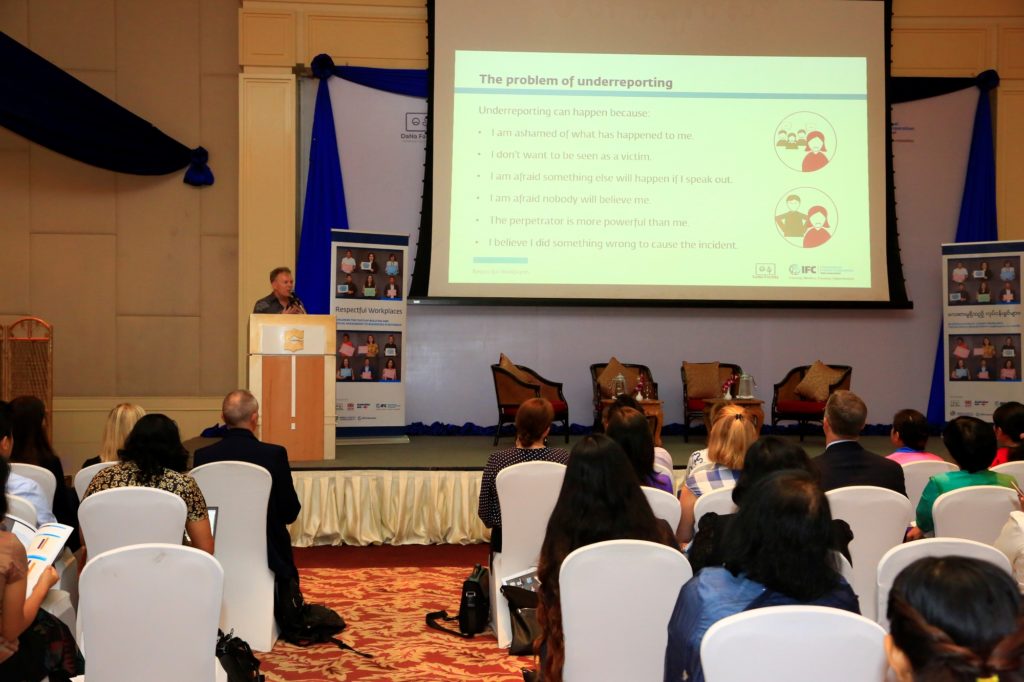Stories of successful women in Myanmar’s garment industry.
We have all seen headlines about the poor working conditions in Myanmar garment factories. While these headlines are certainly grounded in truth, the reality is that for many women in Myanmar, the garment industry is one of the few professions where they can earn enough money to cover their daily living expenses. And for some women, the garment industry has provided the basis for a successful and rewarding career.
Five of those women were the focus of a recent ILO project to highlight the stories of some of the garment industry’s female success stories. We were thrilled to work with the ILO on this project and to meet the inspiring women who kindly contributed their stories and their time. The profiles were written during a series of interviews in the women’s homes and places of work in and around Yangon, Myanmar.
These profiles are meant to inspire the new generations of women coming to play an active role in the world of work, providing examples of how these female leaders cope with life in and beyond the workplace. The profiles include a number of powerful and inspiring women who already hold prominent roles in the Myanmar’s garment industry, be they factory-level operators, supervisors, heads of enterprises, and directors of trade unions or employers’ organizations.
Ms Catherine Vaillancourt-Laflamme, Chief Technical Advisor / Project Manager, ILO Liason Office in Myanmar.
We would like to thank Catherine from the ILO Liason Office in Myanmar for the opportunity to work on this creative and inspiring project, and thanks also to our National Consultants Moh-Moh and Thiri-San who arranged and conducted the interviews.
The profiles can be downloaded directly from the ILO’s website at this link.
Gender smart safety in Papua New Guinea

An innovative partnership between International Finance Corporation (IFC), St Barbara and the Business Coalition for Women (BCFW) in Papua New Guinea has helped to build a safer workplace for female employees working at the Simberi gold mine. The implementation of a “Gender-Smart Safety” program in 2016 resulted in an 18 percent increase in the percentage of women who feel happy about their safety at work.
You might be wondering what it is that makes a safety program “Gender-Smart?” The program involved training a cross-functional team of employees from human resources, safety and housekeeping on how to conduct safety audits to identify risks and hazards faced by women in the workplace. Factive played a key role in researching and developing the Gender-Smart Safety initiative.
This trained team at the Simberi gold mine was able to identify risks specific to female employees that had not been identified using business-as-usual safety practices. By identifying these risks, the team was able to put mitigation strategies in place and monitor their safety performance against a set of key performance indicators.
For more information on IFC’s work on gender in East Asia and the Pacific visit their website here. A summary of the Gender-Smart Safety program (pictured) and how it is helping to create safer workplaces for women at St Barbara’s gold mining site in PNG can be downloaded via this link.
New study finds attitudes towards domestic and sexual violence are changing in Solomon Islands

A new report has been released on The Impact of Domestic and Sexual Violence on the Workplace in Solomon Islands. The International Finance Corporation (IFC) study finds domestic and sexual violence to be pervasive, recent and regular, to have a profound impact on employee well-being, and create substantial costs to businesses.
Encouragingly, however, the study found that attitudes towards domestic and sexual violence are changing. There are much lower levels of acceptance of violence today, compared to previous studies.
The report was produced by IFC in collaboration with the Solomon Islands Chamber of Commerce and Industry, SICCI, the peak representative body for the private sector in Solomon Islands.
If you are interested in this topic, you may be interested to listen to a recent podcast interview with Shabnam Hameed, one of the authors of the report. In the podcast, Shabnam discusses IFC’s work with the private sector to address domestic and sexual violence as a workplace issue.
Women’s Empowerment in Egypt Solar Park

Factive’s principal consultant, Dean Laplonge, had the pleasure of meeting SamaHer in December last year when he was conducting a gender assessment for the International Finance Corporation on their Egypt Solar Fit project. Her recalls her being passionate and determined. And now, rightfully proud.
Despite strong social resistance, SamaHer has proven that so-called “cultural” reasons to explain why women should not do certain types of work can be challenged.
Congratulations from Factive to SamaHer!
Go here for more on SamaHer’s story.
Workplaces free from bullying and sexual harassment are good for business
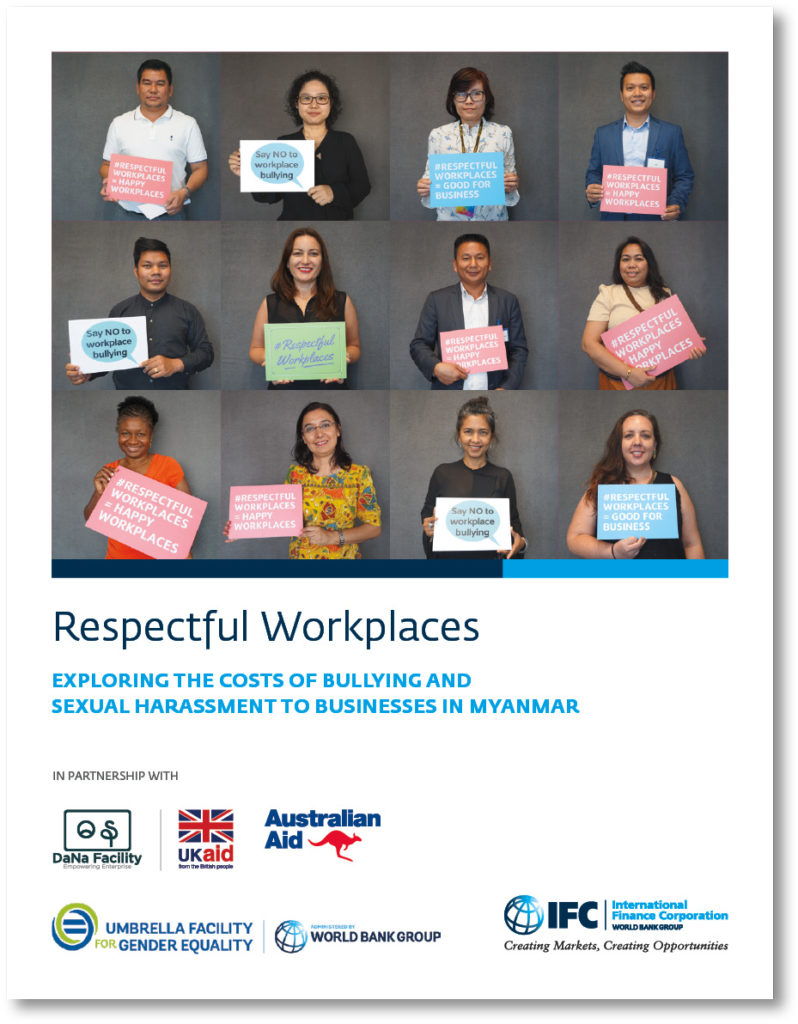
Factive is pleased to announce the official launch of the report: Respectful Workplaces: Exploring the Costs of Bullying and Sexual Harassment to Businesses in Myanmar.
The study was carried out by the Factive team in Myanmar on behalf of International Finance Corporation (of the World Bank Group) and DaNa Facility between September and November in 2018 to understand the experiences of employees relating to bullying and sexual harassment in Myanmar workplaces. There were 39 participating organisations, including 26 large businesses in the agribusiness, finance, retail and tourism sectors.
Some of the key findings of the report:
- Sexual harassment affects all workplaces. 21 percent of employees said they had witnessed an incident of sexual harassment in their current workplace.
- Bullying is more common than sexual harassment. More than half of the employees said they had witnessed an incident of bullying.
- Bullying and sexual harassment are a significant cost to business. On average, the study found businesses experience a 14% loss to labor productivity due to presenteeism caused by bullying and sexual harassment.
- Businesses are not adequately prepared to respond. Very few businesses had formal policies and procedures in place. The vast majority of employees do not report incidents of sexual harassment and bullying. Instead, they ignore them or discuss them on social media.
- Bullying and sexual harassment are workplace culture issues that can be addressed. There were considerable differences in the levels of bullying and sexual harassment across the 26 large businesses. This contradicts the common excuse that these disrespectful behaviors are a natural part of Myanmar culture.
The report offers business leaders in Myanmar an opportunity to understand the experiences of employees relating to bullying and sexual harassment in their workplaces. It also provides a set of practical recommendations, targeting business leaders, human resource managers, employees and other interested parties, to help create workplaces that are safe and free from bullying and sexual harassment.
The report was produced by IFC’s Gender Secretariat in partnership with DaNa Facility. You can download a free copy of the report by visiting IFC’s website. Both Burmese and English versions are available.
What role for business in addressing gender-based violence?

Live panel: Thursday 28 March, 15:00-16:00 GMT / 11:00-12.00 EDT
Save this date to join us for a live panel discussion on what role business can play in addressing issues around gender based violence. A panel of experts from a range of sectors and global regions will be participating to share their insights and experience. The panel will include:
- Chiara Condi, President and Founder, Led by HER
- Katja Freiwald, Global Director Global Partnerships, Unilever
- Shabnam Hameed, Operations Officer, Gender, IFC
- Laura Hawkesford, Head of Private Sector Engagement, CARE International
- Dean Laplonge, International Lead Researcher, Gender, IFC & Director, Factive Consulting
- Neta Meidav, Co-Founder & CEO, The Vault
The topics up for discussion will include:
- Why is gender-based violence an important topic businesses should be thinking about?
- What are the best examples of business approaches and interventions to prevent and respond to gender-based violence?
- How can businesses and other organisations collaborate to address gender-based violence in workplaces and communities?
The panel discussion will be hosted and moderated by Business Fights Poverty. For further information and instructions on how to participate, please browse to their forum page.
Launch of #MiningTogether campaign

International Women in Mining (IWiM) is launching a three-month video storytelling campaign to promote gender equality and inclusion in the mining sector.
We know that many people will have examples of where their own actions, or those of a colleague, or their company, have helped to make the workplace more inclusive. Our campaign is about sparking a conversation around these inclusion moments across the mining sector, by encouraging everyone to tell us what they did and why it matters.
IWiM press release, February 28, 2019
IWiM, which was set up in 2007, supports thousands of women professionals working in the mining and metals sector. It is the fastest growing network for women in the mining industry. It has members in more than 100 countries, and supports over 50 Women in Mining groups around the world.
As part of the #MiningTogether campaign, IWiM is asking people who work in the mining sector to share their experiences of gender diversity and inclusion by recording a short video clip. These videos will be shared on the #MiningTogether – Inclusion begins with us YouTube channel.
“Gathering and sharing stories inspires us all to action. It helps us reflect and consider what have I done and what can I do in my personal capacity to make my workplace more inclusive. This is why we’re asking everyone to email us their short clips, telling us their stories.”
Muza Gondwe, Senior Projects Advisor, IWiM.
For more information about IWiM and the #MiningTogether campaign, see their website.
Online version of Factive’s report for the ILO on gender equality in the Myanmar garment industry.
The ILO is pleased to share the online version of its recently published report on gender equality in the Myanmar garment industry.
“We found that human resources managers admit they prefer to employ women. Managers tend to draw on assumptions about innate gender characteristics whereby women are seen as more docile and naturally more capable of completing work tasks that require attention to detail, such as sewing,” explains Dean Laplonge, the author of the research.
Weaving Gender is the result of many months of meticulous research inside factories and in stakeholder forums where preliminary findings of the gender assessment were discussed.
The online version is available here.
Weaving Gender with the ILO in Myanmar

Factive’s principal consultant, Dean Laplonge, yesterday presented a summary of his research results at the official launch of the report Weaving Gender.
This report provides detailed information on the results of a gender-equality assessment carried out in 16 Yangon-based factories in Myanmar’s garment sector.
Weaving Gender is the result of many months of meticulous research and stakeholders forums where the preliminary findings of the gender assessment were discussed. The ILO Improving labour relations for decent work and sustainable development in the Myanmar garment industry (ILO-GIP), which receives funding support from the Swedish international development agency (Sida) and H&M, is pleased to share a picture of the industry which, despite the challenges, is encouraging. We invite all the industry stakeholders to join hands in the spirit of social dialogue to ensure that workers in the industry, especially women, can enjoy decent work.
You can download a copy of the English version of the report using the link below. The Myanmar language version will be available soon.
Gender Based Violence Awareness Raising
The new toolkit for raising awareness on gender based violence in conflict-affected Syrian communities was launched at the Topkapı Sarayı restaurant in Gaziantep, Turkey, on Friday. This marked the start of 16 Days of Activism to tackle violence against women and girls in Syria.

The toolkit – Hearing and Being Voices in Syria: Working Together to Raise Awareness on GBV – was developed by Factive’s consultant Dean Laplonge for the GBV Sub-Cluster in June this year. It provides comprehensive programs for raising awareness about GBV with women, men, adolescent girls and adolescent boys in Syria. Each program aims to deliver seven key GBV messages to the target audiences using a total of 84 participatory activities spread across 21 sessions in each program.
The seven key GBV messages are:
- Key Message A: The root cause of GBV is gender inequality
- Key Message B: Knowledge of and access to GBV services can save lives
- Key Message C: Mutual support can help prevent GBV and ensure good responses to GBV
- Message D: Child marriage is a form of GBV
- Key Message E: Domestic violence is a form of GBV
- Key Message F: It is not shameful to discuss sexuality and sexual violence
- Key message G: Virginity testing is a form of GBV
Dean delivered the first train-the-trainer course this week in Gaziantep for representatives of some of the Sub-cluster organizations.

He will be working closely with UNFPA and Global Communities to continue this training this coming week, and to assist with developing an inter-agency roll-out plan to promote consistent and effective delivery of the messages throughout Syria.
